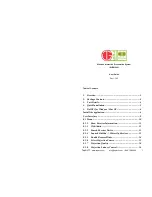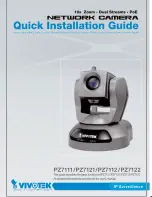
Falcon 1.4M100 Camera Manual
4
4.7
Setting Exposure Mode, Frame Rate and Exposure Time .................................................. 33
4.7.1
Non-Concurrent vs. Concurrent Modes of Operation............................................. 33
4.7.2
Setting the Exposure Mode and Time .................................................................... 35
4.7.3
Exposure Modes in Detail....................................................................................... 38
4.7.4
Setting the Frame Rate .......................................................................................... 41
4.8
Setting a Vertical Window of Interest................................................................................... 42
4.8.1
Frame Rate vs. Active Lines................................................................................... 42
4.9
Flat Field Correction ............................................................................................................ 44
4.9.1
CamExpert Calibration Wizard ............................................................................... 47
4.9.2
Selecting Factory or User Coefficients ................................................................... 48
4.9.3
Enabling Pixel Coefficients ..................................................................................... 48
4.9.4
Selecting the Calibration Sample Size.................................................................... 49
4.9.5
Performing FPN Calibration.................................................................................... 50
4.9.6
Performing PRNU Calibration................................................................................. 52
4.9.7
Saving, Loading and Resetting Coefficients........................................................... 53
4.10
Gain Adjustments ................................................................................................................ 56
4.10.1
Factory Calibrated Analog Gains.......................................................................... 56
4.10.2
Setting Digital System Gain.................................................................................. 56
4.10.3
Subtracting Background ....................................................................................... 57
4.11
Generating a Test Pattern ................................................................................................... 58
Optical and Mechanical Considerations ___________________________________________61
5.1
Mechanical Interface............................................................................................................ 61
5.2
Lens Mounts ........................................................................................................................ 62
5.3
Optical Interface................................................................................................................... 63
5.3.1
Illumination ............................................................................................................. 63
5.3.2
Light Sources.......................................................................................................... 63
5.3.3
Filters...................................................................................................................... 63
5.3.4
Lens Modeling ........................................................................................................ 63
5.3.5
Magnification and Resolution ................................................................................. 64
Troubleshooting _____________________________________________________________65
6.1
Common Solutions .............................................................................................................. 65
6.1.1
Connections............................................................................................................ 65
6.2
Troubleshooting Using the Serial Interface.......................................................................... 66
6.2.1
Communications..................................................................................................... 66
6.2.2
Verify Parameters................................................................................................... 66
6.2.3
Verify Factory Calibrated Settings .......................................................................... 66
6.2.4
Verify Timing and Digital Video Path ...................................................................... 66
6.3
Specific Solutions................................................................................................................. 66
6.3.1
No Output or Erratic Behavior ................................................................................ 66
6.3.2
Line Dropout, Bright Lines, or Incorrect Frame rate ............................................... 66
03-032-20024-01
DALSA





































